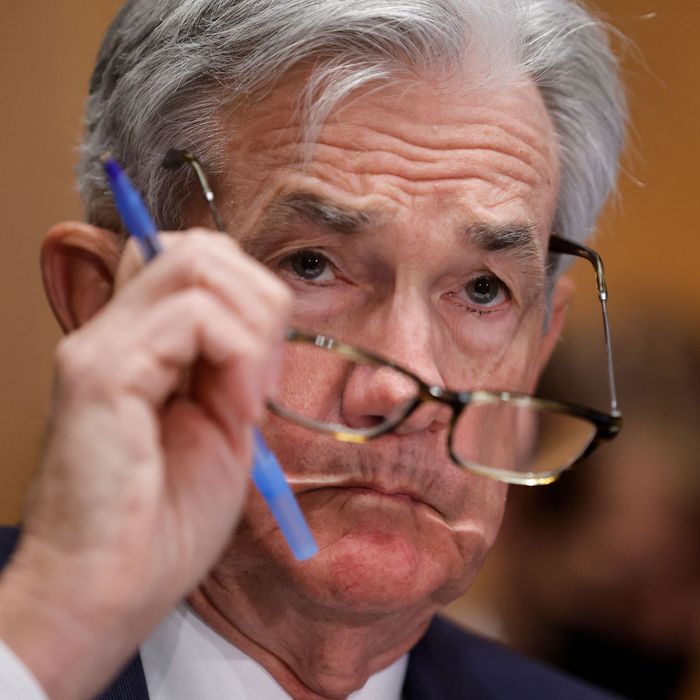
Just as people are ditching their masks, the Federal Reserve chair, Jerome Powell, is dropping the economy’s pandemic protections in order to keep inflation from spiraling out of control.
On Wednesday afternoon, as expected, the central bank’s Federal Open Market Committee officially marked the end of the pandemic economy by raising interest rates by a quarter of a percentage point for the first time in more than three years. This means the cost of borrowing money for mortgages, car loans, and credit cards is going to get more expensive. Paradoxically, this is happening because things are already getting more expensive thanks to inflation, which has reached a 40-year high of 7.9 percent, and the rate hike is intended to keep prices from spiraling out of control. More hikes are coming, too: the Fed’s Board of Governors predicts six increases this year, and Goldman Sachs forecasts ten through next year.
Of course, the end of the pandemic economy doesn’t mean that the pandemic is over, with new coronavirus variants spreading throughout the country, but it does mean that the era of massive stimulus, cheap money, and plentiful high-paying jobs is probably over. That’s because the risk with raising interest rates is how it diverts where money goes. Powell has laid blame for inflation on there being too much demand from consumers, and by hiking rates, he’s trying to make people think twice before making purchases. “Across the economy, we’d like to slow demand so that it’s better aligned with supply,” he said. Still, there are wider repercussions to raising interest rates. If businesses have to spend more money on paying higher interest costs, they may find that they have less money to put in their employees’ bank accounts. With more than 11 million jobs open in the U.S. right now — about 1.7 for every unemployed person — it’s not a given that unemployment will immediately spike up. (For what it’s worth, the Fed predicts a 3.5 percent unemployment rate until the end of 2023, meaning that hiring will continue to tick up). But if the economy is more brittle than it appears, or if a new variant suddenly ravages the economy, the higher rates could have a hand in pushing the country toward a recession in the name of stamping out inflation. “With inflation likely to remain uncomfortably high all year, the FOMC will probably only pause if it thinks further tightening risks pushing the economy into recession,” Goldman Sachs wrote in a note.
Powell, however, played down the risk of a recession. “What we see is a strong labor market. We see a labor market with a lot of momentum, great job creation. And we see the underlying economy is strong.” As such, Wall Street rallied, with the Dow Jones rocketing up nearly 450 points. Still, there are risks that the economy could go awry. There’s the war in Ukraine, for one. “The implications for the U.S. economy are highly uncertain, but in the near term the invasion and related events are likely to create additional upward pressure on inflation and weigh on economic activity,” the Fed said in a statement. But then there’s also China’s economy flattening out. The supply chains are more rickety than they were before the pandemic. Oil is still expensive. Any of these things could send the global economy sideways and further send prices skyrocketing, or kill millions of jobs.
The risk with raising interest rates is that it’s going to hurt the people who can least afford it. If you’re not rich, you’re likely spending most of your income, so any increase in interest payments are going to mean that more goods and services are out of reach. And still, there’s evidence that near-zero interest rates, like the environment the U.S. has been in since the start of the pandemic, increases inequality, since the wealthy invest their excess income. “If you’re a middle income person, you’ve got room to absorb some inflation. If you’re at the lower end of the income spectrum, it’s very hard because you’re spending most of your your money already on necessities and the price is going up. It’s punishing for everyone,” Powell said.
Either way, we’re more likely to be in a world where interest rates are higher than we’ve been used to in a very long time. Maybe we should have known all along this was going to happen. Back in 2018, Donald Trump had fumed that Powell, the banker he’d picked to run the Federal Reserve, was tightening up the economy for fear of inflation. “Every time we do something great, he raises the interest rates,” he said then, adding that Powell “almost looks like he’s happy raising interest rates.” If that’s really the case, then Powell must be a happy man today.
The Fed Hikes Interest Rates, Ends the Pandemic Economy - New York Magazine
Read More
No comments:
Post a Comment